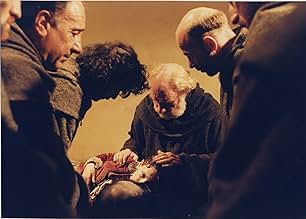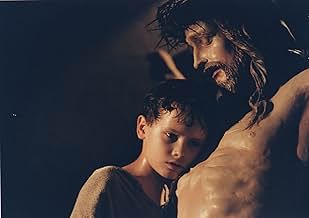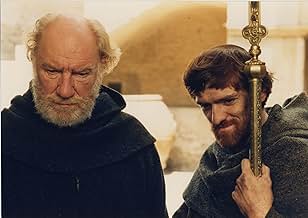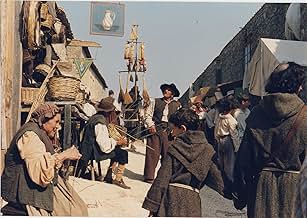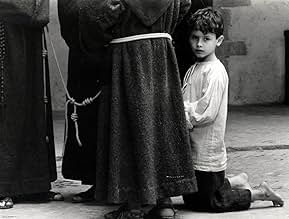Aggiungi una trama nella tua linguaIn the 15th century, in a poor Italian village, the monks of a modest convent take up an abandoned baby. Unfortunately, for all their efforts, they prove unable to trace his parents. So they... Leggi tuttoIn the 15th century, in a poor Italian village, the monks of a modest convent take up an abandoned baby. Unfortunately, for all their efforts, they prove unable to trace his parents. So they set up providing tender loving care to the little boy. Marcellino lives a happy life amon... Leggi tuttoIn the 15th century, in a poor Italian village, the monks of a modest convent take up an abandoned baby. Unfortunately, for all their efforts, they prove unable to trace his parents. So they set up providing tender loving care to the little boy. Marcellino lives a happy life among the men of God but, as he grows up, he misses his mother more and more. To compensate fo... Leggi tutto
- Regia
- Sceneggiatura
- Star
- 1 Contadino mercato
- (as Quentin De Salivet)
Recensioni in evidenza
It was to be his last film ,and it's his legacy .All this life,childhood had been in the center of his work.The Spanish movie was a mystic work,essentially dealing with faith ;few scenes would take us outside (except for the scene of the fair which effortlessly outclasses Comencini's)
More than "Christ and the saints appear to humble people" stuff (first Marcellino,Bernadette Soubirous.......) ,Comencini's main concern was his brat's longing for a mom .
In Vajda's film ,Manuel remains an imaginary character , a friend the kid invents ;Comencini's is a boy in the flesh .And it is pivotal :behind the fence , Marcellino sees Manuel embrace his mom and Nicolo Paolucci makes us feel his harrowing pain ;it is a recurrent feature in the great Italien maestro's canon : be they dead (the mom in 'incompreso" ) or alive but selfish (the dad in "l finestro sul Luna Park"),the lack of motherly (fatherly) love is the child's usual tragedy .In the original work,it's only skimmed over in the -much too short- scene with the mom whith a madonna face.
To have parents do not mean happiness for a child .The wealthy lord who pretends to be the boy's father poisons him with food ,luxury clothes in which the simple boy feels ill at ease : in "Voltati Eugenio" ,the bourgeois parents did not care for their child who found solace with a friend from the working class;in "incompreso" ,the father ,a consul ,wanted his sons to become men overnight after their mom's death .
And education does not necessarily mean happiness: to be taught about fighting,war ,or hunting does not make you a man : the real positive stuff is the alphabet the monk teaches( with a little help of Saint Sebastiane and Saint Andreas ) is the real key to knowledge ;in "Cuore",old school teacher Perboni was Comencini's spokesman ,a master who did not know his pupils would be confronted to the horrors of WW1.The Lord who claims to be Marcellino's dad know only one motto:might is right and using brute force to catch again the brat is only natural.French Bernard -Pierre Donnadieu is ideally cast as this hateful aristocrat .
Comencini's vision of the grown-ups world had always been pessimistic ;poverty ,horrors of war (crippled men in the street) ,the lord and his court wolfing down venison when the people has too much mouths to feed (the scene with the possible adoptive father lay stress at least as much on their poverty as on the working man's brutality .)
And the director makes his hero a rebel against the adults ' world; , he had made Franti ,Edmundo de Amicis 's bad boy in "Cuore" and Lucignolo in "Pinocchio ", postive characters who resisted the adamant moral standards.
Of course the scenes with Christ in the attic are kept to economical levels,which will infuriate Vajda's admirers ;but it was not the artist's priority ; the legendary side is reinforced by the "modern " sequences which frame the movie :schoolchildren buying souvenirs after visiting the premises : to carry on their earthly ride, pie in the sky is not enough for them.
Spanish/Italian/French co-production dealing with a sensitive story proceeded in simplicity and delicacy by Lugi Comencini as when a marvelous friendship between Jesus and Marcelino is born . This a sensible and feeling movie full of mirth , humor touches and enjoyable message based on a novel by Jose Maria Sanchez Silva . At the same time the film gives us an agreeable panorama about monastery life , its pity and goodness ; furthermore , the oration , sacrifice , work , companionship and various situations happen in monastic existence . Its perfect developing resides on superb characters well played by all casting monks and the sympathy , simplicity of Nicolo-Marcelino , but inferior to unforgettable kid played by Pablito Calvo. Musical score by Florenzo Carpi responds appropriately to the ambient , originating a religious atmosphere , though extremely sweet . Precious and luminous cinematography who give us an accurate scenario of the times is developed . The motion picture is professionally directed by Luigi Comencini but is justly inferior to version filmed by Hungarian Ladislao Vadja , that was one of the best films to come out of Europe in the decade of the 50s and touched the hearts of numerous spectators around the world . This modern rendition resulted to be a flop and failed at box office .
However, the black and white Spanish classic has occurred dated to be shown to kids and, in the early 1990s, the Italian director Luigi Comencini remade it. As comparison does not work due to two individual interpretations of the directors, I do not aim at saying which version is better and why. In my comment, I would like to concentrate on some strong points of this remake since the general impression of yours after seeing the film will surely be "a decent drama."
Firstly, since this is the story of a little boy, the film is accurately addressed to children and youngsters. The "in media res" beginning that shows us the group of young tourists who visit the monastery where Marcellino lived gives us a clue to "universality" of a short but beautiful life. These kids, in a sense, are struck by the simplicity of the events, by the uniqueness of the place. The flowers placed by a little girl resemble gratitude. This clear address to youngsters is also proved by very fine scenes some of which I would like to highlight. Consider, for instance, the witty moments with disappearing slices of bread or Marcellino trying to make friend with a spoiled boy from count's palace. I also loved the scene when people see little baby Marcellino in the stable on Christmas night. Although the story is pretty sad, these childlike moments make it a perfect movie for kids and young people.
Secondly, the whole movie gives us a nice insight into the monastic life, its sacrifice, its piety, its prayer, work and brotherly love. That is what we experience, what we get to know with little Marcellino from the memorable moment of his baptism to the final moment of his parting. This piety and simplicity of the life it shows is intensely combined with the entire spirit of the movie. Music, atmosphere, some moments, including the "burning" of the monastery lead us to a specific but profound world of humble brothers. At the same time, it gives us an accurate interpretation of the times developed.
Thirdly, the film conveys the precious message I have mentioned in many of my other comments on various spiritual movies. It is a film we are in need in our times, a film that, despite its lack of fun, gives us joy; despite its lack of realism, gives us faith; despite its lack of great celebrities, gives us authenticity. Like it was the case with the 1955 movie, you watch this story of a little, unnoticed Marcellino and you cry with him and laugh with him. So to say, a viewer young or old feels like a pure, unexperienced, honest child.
Here, a profound reflection arises: what really makes us feel young. People attempt at looking young but what happens inside is a different story. This film appears to give the answer...simplicity of heart similarly to Marcellino. The most touching scene in this movie, for me, was when Marcellino talks to Crucified Jesus and gives him bread. But, before seeing it, try to put aside all sense of spiritual gravity, all sense of earthly logic. Try to see it with an unexperienced "childish" heart and you will see that this is a film about a boy and the dearest Friend anyone can ever have. See it, show it to kids, try to be overwhelmed by the miraculous spirit it promotes.
No great performances, no stunning cinematography, just a movie, just a story but...what a story!
Lo sapevi?
- ConnessioniRemake of Marcelino pan y vino (1979)


